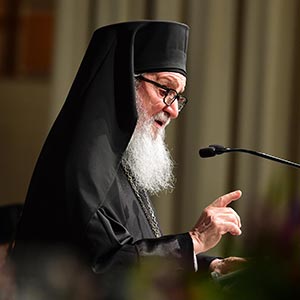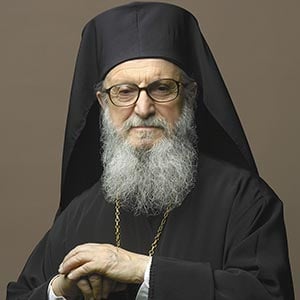In our last reflection, studying the theme of our most recent Clergy-Laity Congress "Gather My People to My Home," we focused our attention on the word "Gather." As a consequence, a serious question was raised: Who are the people whom we are trying to "gather"?
There are several categories of people that could be included in the answer to the above question. In today's reflection, however, let us limit our thoughts to one such category, namely the people described as "disconnected." By using the term "disconnected," we mean the Orthodox Christians, perhaps close friends or even relatives of ours, who, for one reason or another over the passing of time, have lost what had once been for them a close connection to the Orthodox Church.
The case of the "disconnected" Orthodox Christians should not be a well-known phenomenon to us. Sadly, however, we encounter such cases in people who comprise not only our friends or co-workers, but even members of our own family, which is the most intimate community of spiritual and social significance in our lives. Because of this, the phenomenon of the "disconnected" Orthodox Christians is one that confronts us, as Church, with many questions: What are the reasons why Orthodox Christians cease their involvement with the life of the Orthodox Church and become disconnected? Are Orthodox Christians who cease their involvement with the Church doing so slowly over time, with no particular reasons; or are they leaving abruptly due to specific incidents within the parish and with feelings of unresolved anger? Do our "disconnected" people feel that the Church is not speaking with relevance to their daily lives and is not meeting their spiritual needs? Have some people experienced painful events or crises in their lives which they felt that the Church was unable to address meaningfully or competently, and, consequently, decided to cut their connections with the Church?
These questions raise some serious issues of concern that require all Orthodox Christians, particularly the laity and clergy who occupy leadership roles within the Church, to reassess the manner by which we are truly listening and responding to the needs of the people. This requires a conscious shift in our thinking and in our attitudes. It requires that we should not be lazy in our thinking or in our awareness of contemporary social trends, movements, and alternative lifestyles that others around us may be adopting, and which might influence our minds, and those of our children, at some level. Our own Archdiocese has recently created on Office of Church and Society that will help us to collect and analyze pertinent reports and statistics, so that we may better understand the complex forces at work in our society and direct our ministries accordingly to these challenges and to our own specific concerns as the Greek Orthodox Church in America.
Yet this effort must not only remain at a general level. It must be the conscious concern of each of our local parishes, with the guidance and supervision of their respective Metropolises. If we are truly serious about the Lord's exhortation to "Gather" His people to His Home, then each parish of our Archdiocese should be devoting substantial time and resources to addressing the difficult question of how to gather the "disconnected." One easy opportunity for the parish to do this, is to host an evening during the week, or perhaps on a Sunday afternoon after the Divine Liturgy, to provide people in the parish with the opportunity to come together to reflect openly about these questions, with the goal of stimulating creative suggestions for local ministries in the "Gathering" of God's People to His Home, especially of gathering the "disconnected."
Of course, each parish should be in the process of forming a special committee to focus on the task of reaching out to the "disconnected" Orthodox Christians in their immediate area and environment, with the goal of eventually expanding their work to the "Gathering" of God's people who comprise larger and more distant segments of the population. For if we do not begin our task of "Gathering" God's people to His Home, by opening our hearts to the concerns of those closest to us who have been baptized or chrismated as Orthodox Christians and who, for one reason or another, have distanced themselves from the Orthodox Church, how can we be responsive to God's command: "Gather My People to My Home"?
The issues raised and suggestions discussed in this brief reflection are not new ones at all. Many of them were already included in the Keynote Address which I had the honor to deliver at our most recent Clergy-Laity Congress in Washington, DC, where this theme was introduced. The passage of nearly a year since that important Congress only reinforces the need to repeat some of these suggestions, as the phenomenon of the "disconnected" remains as urgent of an issue now as it did a year ago, indeed even more so, as statistical data from recent sociological studies are indicating. I invite you to reflect more deeply upon the contents of this reflection piece and, before anything else, to start praying for the reconnection of the "disconnected" with God's Home, His Church.
† DEMETRIOS
Archbishop of America

